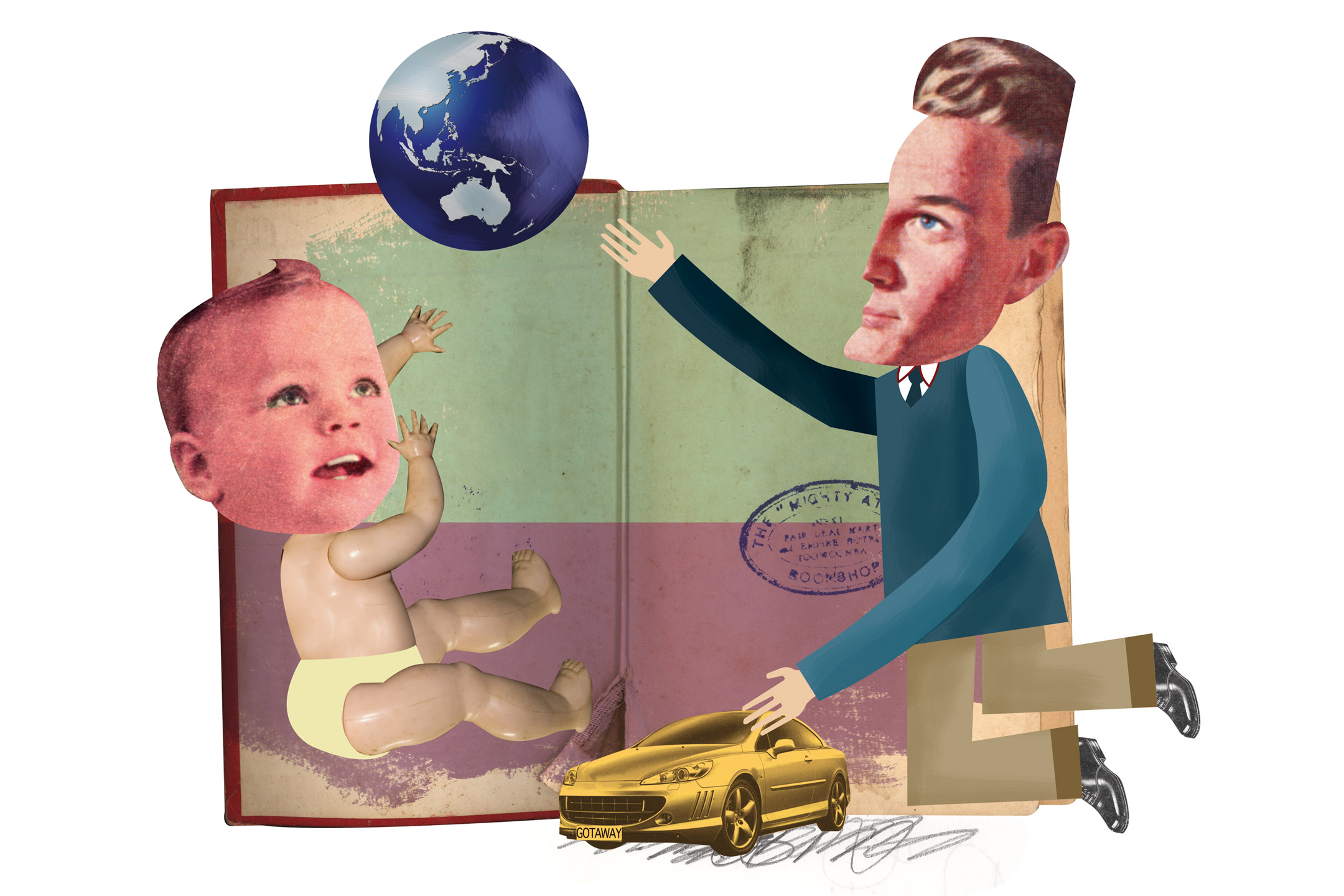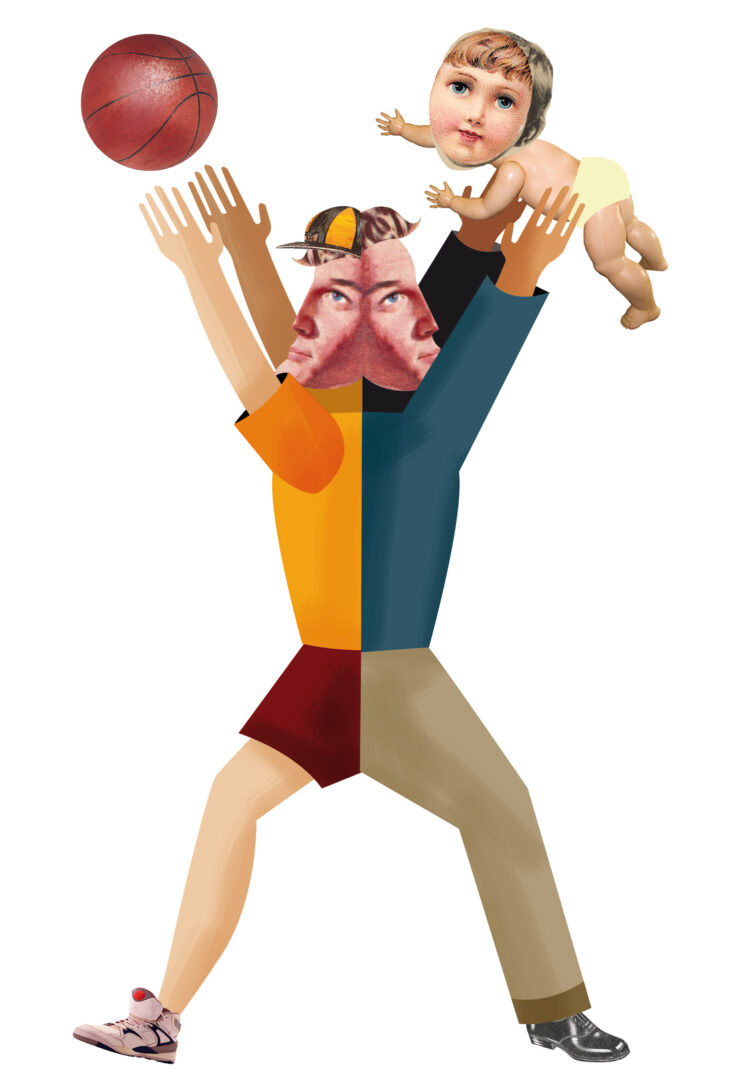
09 May My Son, The Teenage Dad
Judith Kirkwood has mixed feelings about her 18-year-old son becoming a father.
I didn’t know what to say when my teenage son, Robin, told me one winter afternoon that he was going to be a father. That didn’t stop me from mumbling something like, “I hope you’re happy. This is the kind of thing that happens when you think you know everything.”
I was angry. Yes, I could see how scared he was – and my heart was breaking for him – but I was hurt and I didn’t want to let him off easily. On the one hand, I was shocked that my son was going to be a father. He was a good kid. And in spite of having an unremarkable school career, he showed up every day and had never been in any trouble. He was efficient and reliable at his part-time job. On the other hand, I had been half expecting to hear this sort of news from him since he had poked his head into my bedroom late one night to tell me he was in love. I was alert, but not alarmed, and tightened security.
I talked to him about how even though teenagers in our culture are bombarded with ads, TV shows and songs that were all about sex, they were not necessarily ready for the consequences. Robin was furious that I didn’t trust him. He was always home by an agreed-upon time, followed our rules most of the time and grudgingly listened to my lectures. But Robin and his girlfriend were hormonal teenagers, biologically programmed, and the end result was the oldest story in the book.
Now I was living my worst nightmare. Robin’s face, grey with worry and fear, had the haunted look of someone who lived in a war zone, not a high-school student a few months from final-year celebrations.
Before his impending fatherhood, Robin’s goals had been to stay out as late as he wanted and to move away from home as soon as possible. He had visions of travelling the world and owning an expensive car. As parents, we knew that reality would catch up with those fantasies. We trusted that he had time to figure out what he wanted to do.
But Robin no longer had the luxury of daydreams about what might be. The future was here. He decided not to rush into marriage, pointing out the obvious factor: his age. “I think it will be hard enough trying to figure out how to be a father,” he said. He may not have married, but he did support his girlfriend emotionally. My vision of what was in store for these two was, to put it mildly, not terribly rosy. My mother, trying to console me, said, “Life is change”. ‘Shut up,’ I wanted to snarl. I didn’t make her a grandmother until I was 29, a reasonable age for that kind of responsibility. My son was only 18. This was not a good thing.
 Fast-forward seven years: I can say now that it was a good thing. My granddaughter, Kailey, has been the light of our lives since the day she was born. At six years old, she is a perfect companion for me. We read books in tents made with blankets draped over furniture, sing while swinging in the backyard, clean and cook (her idea, not mine), play with dolls and have tea parties. I didn’t know it, but I needed a little girl in my life.
Fast-forward seven years: I can say now that it was a good thing. My granddaughter, Kailey, has been the light of our lives since the day she was born. At six years old, she is a perfect companion for me. We read books in tents made with blankets draped over furniture, sing while swinging in the backyard, clean and cook (her idea, not mine), play with dolls and have tea parties. I didn’t know it, but I needed a little girl in my life.
As for Robin, being a single, teenage dad was difficult. He went to a technical college, worked part-time, studied, took care of Kailey part-time and paid child support. But we all pitched in. On the days that Robin had Kailey, he would wake me early so that I could keep an eye on her while he showered and got ready for TAFE, before dropping her off at daycare. In the evenings, my husband and I took turns playing with Kailey while one of us quizzed Robin on homework. We all helped with changing nappies and feeding, shopping for groceries, clothes and toys. But Robin was in charge. He was the dad.
It was a lonely time for our son. Robin was afraid of being judged for being such a young parent; he felt that people gave him disapproving looks when he was out with Kailey by himself. He was embarrassed to run into his friends when he was shopping for nappies or clothes for little girls. He had no peer group; no friends with whom he could share stories about his daughter’s progress.
But there certainly was a silver lining to this: I don’t think Robin would have been motivated to set and achieve goals right out of high school if he hadn’t been scared out of his wits about providing for his daughter. Based on his high-school grades, my husband and I would never have predicted that he would get high marks in difficult courses, or that he would get a job changing tracheotomy tubes and weaning heart-surgery patients off ventilators in a hospital. In addition to all his other responsibilities, he managed to train and work as a volunteer firefighter and emergency medical technician, as well as volunteer with children at a shelter for victims of domestic violence. Having Kailey not only made him a father, but it turned a self-absorbed teenager into a man.
For quite a while, Robin’s forays into new relationships always ended with the young woman not being ready for instant motherhood. Then Robin met Katie, and they married. They live in a small town near us with their new baby Hannah; Kailey lives with them part-time. They both work several jobs, yet have arranged their schedules so that they don’t need outside childcare. They have just bought their first home and are active in their church and at Kailey’s school. Robin and Kailey’s mum have worked hard at co-parenting and communicating, and I’m proud of both of them and of Katie for all getting along.
All of this I could not have predicted on that winter afternoon, when my son’s news was about as welcome as a truck ploughing through the middle of our suburban house. I wish I’d said then, ‘Your dad and I will support you the best we can, no matter what. It will be difficult, but everything will turn out okay.’
Perhaps not so surprising is the sense of loss I felt when my son and granddaughter moved out to become part of a new family. It was almost as painful as the dread I had lived with in the months before Kailey was born. “Life is change,” my mother said, consoling me. And this time, I knew what she meant. Everything is going to be fine.
Illustrations by Ron Monnier




